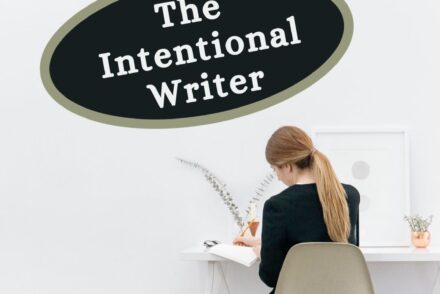Writers of all levels know the importance of continuing to learn new skills, refine writing skills, and challenge themselves. How intentional are you about growing your writing craft?
Would it help to set yourself some goals in the area of developing your writing craft? Here are seven areas where you can become more intentional about growing as a writer.
Three ways to learn your writing craft
Training – workshops, webinars, and classes. One of the best ways to learn writing craft is by listening to experts teach on specific aspects. This is one of the many benefits of attending writing conferences or belonging to a writers group that features monthly speakers. These events offer a variety of subjects for writers of all levels. However, you can also find a good writing instruction on the internet, including free webinars. Many online instructors offer free webinars to attract students to their paid offerings, but we can benefit from their free content without guilt.
How intentional are you about learning? Do you have any upcoming workshops or conferences in your schedule?
How-to instruction – Blogs, books, and podcasts. There is no shortage of worthwhile how-to advice to help you improve your writing skills. In fact, you are reading this post right now. Good for you! How intentional are you about learning new skills? Do you browse writing sites on a whim, or is it part of your regular weekly schedule? When was the last time you picked up a book on writing with the intent to learn something new?
DIY – Active participation. The best way to take full advantage of either of the above options is to do the homework. This could mean working through exercises, if any are given. Or it could means going back to your work-in-progress and immediately applying something you learned in the workshop, blog post, or book chapter. Using what you’ve learned, rather than just reading or listening, will help cement those new skills or concepts into your brain.
Four ways to hone your writing craft
Feedback. Getting critiques of our writing is critical for writers of any level. We don’t know what we’re doing well and what we need to work on without feedback. We should be seeking input from a variety of sources, from fellow writers at our local writers’ group, to Beta readers, to professionals. Many conferences offer an option for fifteen-minute appointments with writing professionals. Come prepared with a printout of your first chapter and these short sessions are a prime way to get professional feedback without paying extra.
Look for good examples. One you’ve learned a concept; you can look for it out in the wild. Train yourself to pay attention to techniques, structure, and other good writing skills as you read, and when you watch TV or movies. Can you identify the key plot components, such as inciting action or midpoint twist? (A TV show can be a great way to observe the structure behind a story, because the show must move through the whole three-act structure in a short time.) It’s also helpful to keep a file or journal for collecting writing snippets that really hit you, such as great descriptions or pithy dialogue. These can inspire your own great writing.
Experimentation. You may prefer writing romances, but it’s good to stretch yourself and try a different style of writing from time to time. Perhaps try a brief sci-fi or mystery story, or write a poem or two. It doesn’t matter how good these pieces are, because the goal is to stretch your thinking and creativity muscles, not to create anything worth sharing with the public.
In a similar vein, experiment with how you write. Try various techniques, such as writing with music, or talking our your scenes out loud before writing them. You won’t know for sure until you’ve tried a new technique a few times whether it might enhance your writing.
Teach others. Teaching others what you know is a tried-and-true way to help others while also helping yourself. Teaching skills or concepts to others helps you master them and/or understand them on a deeper level yourself. You don’t need to be a best-selling author to teach writing skills. Whatever you’ve learned and found helpful will be helpful to others, too. So, never be afraid to share what you’ve learned with others who want to hear it.
I hope these ideas will spur you on to grow in your ability and knowledge as a writer. Which one of them will you take action in today?

An engineer-turned-mystery-writer, Lisa E. Betz infuses her novels with authentic characters who thrive on solving tricky problems. Her debut novel, Death and a Crocodile, won several awards, including Golden Scroll Novel of the Year (2021). Her second mystery, Fountains and Secrets, released in January, 2022.
Lisa combines her love of research with her quirky imagination to bring the world of the early church to life. She and her husband reside outside Philadelphia, Pennsylvania, with Scallywag, their rambunctious cat—the inspiration for Nemesis, resident mischief maker in the Livia Aemilia Mysteries. Lisa directs church dramas, eats too much chocolate, and experiments with ancient Roman recipes. Visit her at lisaebetz.com or her Facebook page, LisaEBetzWriter.





No Comments